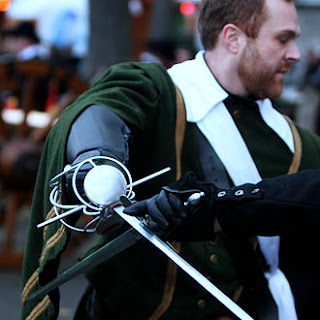Good writing’s about using the right word in the right place. Not sure what I mean? Let me give you some examples.
Ever called someone as mad as a hatter? Do you think this comes from Alice in Wonderland? Then you’re mistaken. Lewis Carroll based his character on the hat makers of the time.
They used mercury on a daily basis when felting fabrics. Unfortunately, exposure to mercury causes mood swings, aggressiveness, and antisocial behavior. Just by adding the word mad, Carroll shows us a pale-faced character who shakes constantly and shouts out as inappropriately as a modern day Tourette’s syndrome sufferer.
Here’s an exercise for you. Imagine a renaissance knight and his weapons. What do you see? A long sword wielded two-handed as he smites his enemies? How about a sumptuously dressed noble with a rapier at his side? Or the more common sword and buckler? Never heard of them? I hadn’t either. A visit to the Royal Armouries museum in my hometown of Leeds, England gave me a new take on the Mercutio and Tybalt fight in Romeo and Juliette.
A buckler is a small shield about the size of a dinner plate. It has a handle at the back and a boss or round bulge front and center. Usually, they were made from metal, but some swordsmen used a cheaper, leather version. These were the weapons of the common people.
SCENE I. Verona. A public place.
Enter SAMPSON and GREGORY, of the house of Capulet, armed with swords and bucklers.
If you know the weapons, as Shakespeare’s Elizabethan audiences certainly did, you instantly know these retainers fight Spanish style. That’s freer and easier than the classic Italian styles.
The swordsman uses short stances and attacks from different angles. Some tutors of this style fell back on mathematics and suggest angles for the swordsman to strike at. To knowledgeable Elizabethans, these weapons mark the swordsman as a barbarian. That’s why the Mercutio calls Tybalt, a rogue, a villain, that fights by the book of arithmetic!
In contrast, Romeo says, “Gentle Mercutio put thy rapier up.” Instantly, the audience knows Mercutio fights in a more gentlemanly style, using his rapier and dagger. He’ll move with quick thrusts in and out that require wrist action and balance. His technique took training, dedication, and skill. Even in Regency times, gentlemen wanted Italian fencing masters.
A knowledgeable audience got all that just by looking at the combatants. Shakespeare didn’t need long explanations. He let his characters’ weapons do his talking for him.
In another of Shakespeare’s plays, Julius Caesar, Casca sits through one of Cicero's orations. I picture him shuffling on the bench and yawning from boredom. Why? Because Cicero spoke in Greek and Casca didn’t understand anything Cicero said.
Casa dismissed the entire speech with his off hand, “It’s all Greek to me.”
Interestingly, this tells us more about Casca than he’d like.
Back then, language split the world. Thanks to Alexander the Great and his conquests, Greek was the language of Asia Minor while the Roman Empire spoke Latin. Well-educated Romans learned Greek for diplomatic reasons.
Not Casca though.
Either he lacked the skill to learn another language or his education didn't include Greek. Casca, the man who struck the first blow in Caesar’s assassination, held the office of Tribune of the People. He came from a different background to the rest of the Senate, and his role was to look out for the Plebian or middle-class interests. Look how many words I used to tell you about him. Shakespeare summed him up in one line. “It’s all Greek to me.”
One thing great writers know is it’s the little details that make up the big picture.
I've tried to think of the details when I wrote my best selling E-book, To Seduce an Omega
While I'm proud of my books, I'd never compare my writing to the bards, or even Lewis Carroll's. Then again, they didn't write about werewolves. .
Buy links
Blurb
The Rock Prowler alpha condemns Viola for her inability to shift. Forced into poverty and isolation, she ekes out a meager existence as a healer. As the pack omega with a crippled knee, she’s forbidden to mate. Her first heat beckons, but no wolf will dare to bed her.
Titus, a wolf rejected by his true mate, overflows with violence and anger. The Lykae King sends him to take over the Rock Prowler pack. He condemns Viola for wanting payment before she treats her patients and threatens to bring in a new pack healer. With her crippled knee and no other income, she’d starve.
She-wolves from families who disagree with the alpha have vanished. When Titus investigates, the alpha’s allies imprison both him and Viola. To escape, he must seduce Viola—the she-wolf he insulted and reviled. If that’s not bad enough, she despises him for his seeming allegiance to the alpha. As he gets to know her, she steals his heart, but after all that’s happened, how can she accept him when even his fated mate refused him?
Titus, a wolf rejected by his true mate, overflows with violence and anger. The Lykae King sends him to take over the Rock Prowler pack. He condemns Viola for wanting payment before she treats her patients and threatens to bring in a new pack healer. With her crippled knee and no other income, she’d starve.
She-wolves from families who disagree with the alpha have vanished. When Titus investigates, the alpha’s allies imprison both him and Viola. To escape, he must seduce Viola—the she-wolf he insulted and reviled. If that’s not bad enough, she despises him for his seeming allegiance to the alpha. As he gets to know her, she steals his heart, but after all that’s happened, how can she accept him when even his fated mate refused him?






No comments:
Post a Comment